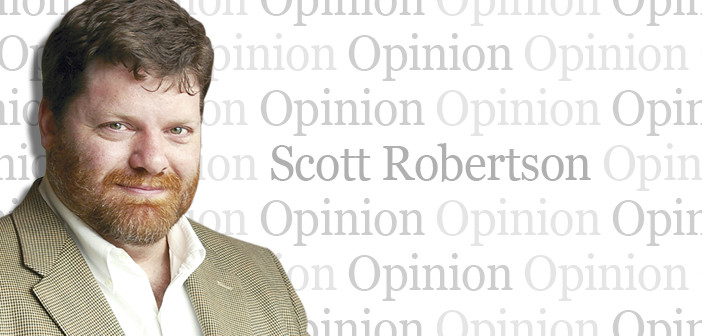By Scott Robertson
July is one of my favorite months because it’s Healthcare Heroes month at The Business Journal, our sister publication. Twenty-six years ago the Journal’s owners understood the value of health care in our region and set out to honor those who generally don’t believe they’re doing anything heroic, but who save lives every day. Without healthy employees and customers, The Business Journal reckoned, there is no business community for us to cover.
So each year we receive dozens of nominations – stories of professionals in the healthcare community who go above and beyond the call of duty to make sure you and I receive the best quality care they can provide. We’ve told the stories of EMTs who braved the chilling water of a mountain stream on a sub-freezing morning to save a man’s life, of a custodian who would quietly sing hymns in the rooms of patients in whose rooms she saw Bibles, and of behavioral health specialists who helped get decade-long abusers of drugs clean so they could reunite with their children and become real parents again. We’ve told stories of donors who gave millions of dollars and of volunteers who gave thousands of hours. We’ve told stories of administrators who found ways to see that care was delivered more cost-efficiently as prices in the industry were rising, and of support staff who, without remuneration or expectation of recognition, went to patient’s homes to help with transitions or just to feed a patient’s pets. Twenty-six years with 25 honorees each year, and we never run short. Think about that.
This year we did not lack for stories of heroism, both large and small. I must admit I teared up more than once as I read the biographies aloud during the presentation of the honorees at Friday’s annual Healthcare Heroes luncheon at the Carnegie Hotel.
Some of the stories are of providers who would say they are simply doing their jobs, but who make profound differences in the lives they touch.
Consider the story of a patient named Macy, who waited 16 years for someone to say, “Pick up your bed and walk.” Before Dr. Brandon Green arrived at Niswonger Children’s Hospital, there were no pediatric orthopedists in the area. Many of the young people who are now his patients were not receiving treatment because their families were unable to manage the travel required for such specialized care.
Macy, who became one of Dr. Green’s patients, had suffered from a congenital hip condition since birth. She struggled to walk and move without pain. Though her mother had taken Macy to several doctors, none was able to correctly identify her condition or refer her out for appropriate care. Immediately, Dr. Green recommended surgery. Macy and her mother were nervous, but agreed. Following a successful surgery, Macy is now able to walk, and her mother says her confidence has improved exponentially.
Some stories are of those individuals who may not directly provide care, but for whom care is second nature. Chris Miller, associate administrator and chief experience and outcomes officer at Ballad Health, and his wife Sabrina were so affected by the realities of neonatal abstinence syndrome babies – those babies whose mothers had abused drugs during pregnancy, and who were thus born addicted to those drugs – that they adopted a NAS baby five years ago. Since then, the Millers have been advocates for NAS babies. This year, Chris travelled to Washington to share his experiences with those who can help shape policy.
Other Healthcare Heroes provide moments of joy, or comfort, or even beauty in the midst of discomfort and disability. Take, for instance, Charlie Lawson. This 89-year-old volunteer plays the piano in the lobby at Bristol Regional Medical Center. One day a husband and wife who were listening to Charlie play, the husband in a wheelchair due to Parkinson’s disease. The wife told Charlie about her husband’s condition. Then, as Charlie played their favorite song, the gentleman reached over to his wife and offered her his hand to dance. The gentleman’s feeble body could hardly get out of the wheelchair, but the couple slow-danced together as Charlie played. Tears rolled down the wife’s cheeks. She later said they had never danced before.
That story affects me more than any other in the 14 Healthcare Heroes events in which I have taken part. It doesn’t involve great sacrifice or risk. It doesn’t involve someone making thousands of lives better at a time. It’s not, in the literal sense of the word, particularly heroic. I think this couple’s story is so affecting because it most clearly links healthcare and love.
Because I have covered healthcare as a business, I understand that in most cases, as a former Wellmont administrator once somewhat cynically pointed out, health care is a byproduct of economic and commercial actions. But it is also one of the settings in which love is at its most prevalent. Providers take action, sometimes routine, sometimes extraordinary, because they are motivated by the knowledge that taking care of each other is the right thing to do.
For those motivated by faith, they know it is what God would have us do. For those motivated by hope, they know they have the power to make someone’s tomorrow better than today. But 1 Corinthians 13:13 says, “And now these three remain: faith, hope and love. But the greatest of these is love.”
That is reason enough for me to thank all those who have a hand in providing care, no matter how heroic or mundane the action. To the nurse reading to a dying patient, thank you. To the transporter throwing out his back trying to help position a morbidly obese patient for a study, thank you. To the doctor donating time to a free clinic, thank you.
I call you all heroes because yours are the hands of love in the world.




